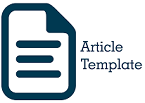THE INFLUENCE OF PEER COMMENT ON FACEBOOK AND GENDER TOWARD WRITING ABILITY TO THE ELEVENTH GRADE STUDENTS OF SMA NEGERI 5 PALEMBANG
Abstract
Keywords
Full Text:
PDFReferences
Alderson, J.C., C. Clapham, and D. Wall. (1995). Language Test Construction and Evaluation. New York, NY: Cambridge UniversityPress.
Bacha, N. N. (2002). Testing Writing in the EFL Classroom: Student Expectations. English Teaching Forum. 40(2): 14-16.
Best, John W. (1987). Research in Education. Englewood Cliffs. New Jersey: Prentice-Hall Inc.
Frankel, J.R and N.E. Wallen, Norman E. (1990). How to Design and Evaluate Research in Education.Washington, DC; McGraw-Hill, Inc.
Hatch, E. and H. Farhady. (1982). Research Design and Statistics for applied Linguistics. MA:Newbury House Publishers, Inc.
Indrawati. (2009). Developing the Students’s Writing Ability by Using Effective Peer Response Model. Unpublished Graduate Thesis, Graduate School, Sriwijaya University, Palembang: Unsri.
Murdoch, G. (2002). Exploiting Well-Known Short Stories for Language Skills Development, IATEFL LCS Newsletter 23, p.p. 17-19.
Nunan, D. (1991). Language Teaching Methodology. A Textbook for Teachers. New York: prentice Hall Inc.
Oxford, R. L. (1990). Language Learning Strategies: What Every Teacher Should Know. Boston, MA: Heinle&Heinle Publishers.
Phillips, K. C, & Steiner, B. (1985). Creative writing: A handbook for teaching young people. Littleton, CO: Libraries Limited, Inc.
Richards, Jack C and Willy A. Renandya (Eds). (2002). Methodology in Language Teaching: An Anthology of Current Practice. London, UK: Cambridge University Press.
Richardson, Brian. (2000). Narrative Text. www.findarticles.com/p/
Teo, A. K. (2006). Using Peer Assisted Writing Activity to Promote ESL/EFL Students’s Narrative Writing Skill. TESL Jounal, Vol. XII, No. 8, August 2006.
Thihendradi, C. (2008). Step by Step SPSS 16 Analisis Data Statistik. Yogyakarta: Andi Publisher.
Zipprich, M. (1995). Teaching web making as a guided planning tool to improve student narrative writing.Remedial and Special Education, 16(/), 3-15, 52.120
DOI: https://doi.org/10.32502/ecj.v1i1.647
Refbacks
- There are currently no refbacks.
Copyright (c) 2017 English Community Journal
The Departement of English Education, Faculty of Teacher Training and Education, Universitas Muhammadiyah Palembang
Jl. Jenderal A. Yani 13 Ulu, Seberang Ulu II, Palembang (30263), Indonesia.
Indexed by :
English Community Journal has been listed in :

English Community Journal by http://jurnal.um-palembang.ac.id/index.php/englishcommunity is licensed under a Creative Commons Attribution-ShareAlike 4.0 International License.







